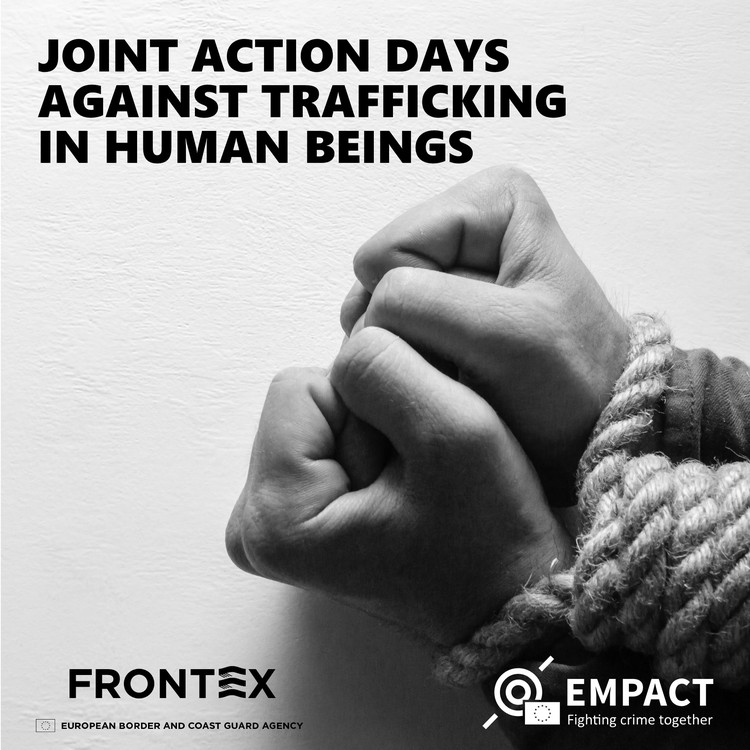Frontex, the European Border
and Coast Guard Agency, teamed up with 33 countries, Europol and Interpol to
combat the crime of trafficking in human beings, especially children.
More than 22 000 officers were involved in the week-long operation (Joint Action Days) that took place between 6 and 13 June. During the action, authorities checked more than 970 000 persons, hundreds of homes, commercial establishments, transportation hubs and border crossing points. Together with NGOs, our partners also organised information campaigns in schools and at borders to inform minors about the risk of trafficking in human beings.
Results of the operation:
- 134 arrests, including 29 for THB for sexual exploitation and 4 for labour exploitation
- 226 fraudulent documents identified
- 64 suspected traffickers identified
- 134 potential victims, incl. 15 minors
- 104 new criminal cases opened
Trafficking in human beings is a crime that affects thousands of people around the world. It often takes place across borders, which makes the cooperation between countries within and outside the European Union and international organisations essential. As early detection of potential victims is crucial in preventing this crime, the role of border guards and police officers is particularly important.
The timing of the operation is particularly relevant, as more than seven million people have fled Ukraine since the beginning of the invasion, most of them women and children. The massive numbers of people fleeing the country puts the people in danger of being abused by criminal groups, with unaccompanied children particularly at risk. Criminal networks may try to use this crisis for sexual, labour or other types of exploitation.
As recently reported by Europol, trafficking in human beings has long been a lucrative business venture for criminal networks relying on a vast and dynamic infrastructure, already established and spread throughout the EU. Eastern Europe has been a key region of origin for victims of this crime.
The operation focused on migratory movements towards the European Union at all types of borders, as well as secondary and further movements across Europe. The participants, including European, Western Balkan and North African countries, analysed the forms of this crime prevalent in their own country. The presence of the representative of the Ukrainian National Police/Migration Department in the Coordination Centre set up by Frontex in Warsaw was very important.
The information gathered during the action will be used by law enforcement and judicial authorities to dismantle and disrupt criminal groups trafficking in human beings and to better protect victims of this crime. As a result of the action, the Spanish Guardia Civil opened a case against an organised group in the Melilla which was committing crimes related to human and drug trafficking involving minors. Eurojust stands ready to coordinate the cross-border investigations that are being triggered by the Joint Action Days to facilitate that the interventions lead to justice being done for the child victims. Judicial involvement in these investigations is essential to ensure that traffickers are not just found and arrested, but that they are brought to justice in the courts.
Together against organised crime
The action was organised under EMPACT, the European Multidisciplinary Platform Against Criminal Threats. It tackles the most important threats posed by organised and serious international crime affecting the EU. EMPACT strengthens intelligence, strategic and operational cooperation between national authorities, EU institutions and bodies, and international partners. EMPACT runs in four-year cycles focusing on common EU crime priorities. Fighting trafficking in human beings is one of the priorities for the 2021-2025 cycle.
Participants
Participating countries:
Spain, Portugal, Germany, Netherlands, Greece, Italy, Belgium, France, Romania, Austria, Bulgaria, Cyprus, Croatia, Hungary, Poland, Ireland, Slovakia, Sweden, Switzerland, United Kingdom, Latvia, Albania, Serbia, Montenegro, Bosnia and Herzegovina, North Macedonia, Ukraine, Moldova, Nigeria, Morocco, Algeria, Tunisia, Vietnam
EU agencies and international organisations: Europol, Interpol, Eurojust
